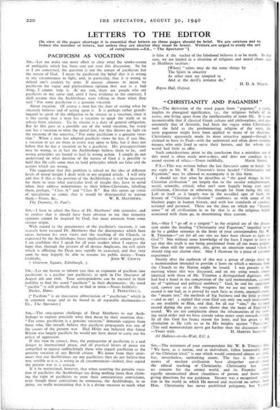" CHRISTIANITY AND PAGANISM "
Sit,—The derivation of the word pagan from " paganus," a rustic, implies its aboriginal significance, i.e., the religious beliefs of the rustic, one living apart from the intellectuality of town life. It is not inconceivable that if classical Greek culture and philosophies, and pre- eminently that of Aristotle, had been the vogue when Christianity took the field as the predominating religion of the west, the term paganism might have been applied to many of its doctrines. Christianity apparently made its most attractive appeal—though it claimed to have its Paul—with the unlettered and often dowr-trodden masses, who only lived to serve their betters, and for whom this world had little to offer.
Such considerations point to the conclusion that a mistaken use of this word is often made now-a-days, and does not conduce to a sound system of ethics.—Yours faithfully, MAUD Sissox.
P.S.—This was written before the last Spectator came to hand. So my reply to Mr. W. R. Titterton's letter headed " Christianity and Paganism," may be allowed to accompany it in this form.
I should say that what he describes as " the good things in that Christian civilisation " are largely due to the secular enlightenment, social, scientific, ethical, what not? now happily being cast upon civilisation, Christian or otherwise, though far from being the rule. Left to itself as it largely was in the so-called ages of faith. the history of " Christian civilisation " confronts us with some of the blackest pages in human history, and with low standards of conduct, national and personal. These are the -lines on which my "historic sense " of all civilisations in so far that is as the religious beliefs associated with them go, in determining their current.


























 Previous page
Previous page